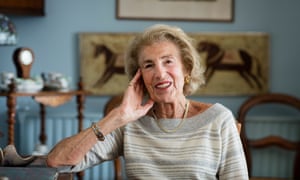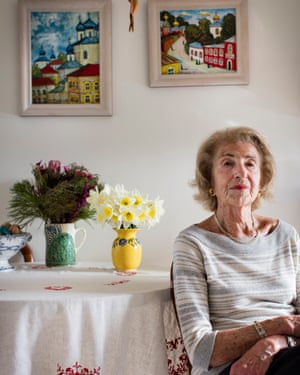
As one of the Guardian’s first female foreign correspondents, she reported on events that shaped the world in the late 20th century, from Watergate to the Gdansk shipyard strikes and the collapse of the Soviet Union.
Today, Hella Pick remains an extraordinary physical presence. Now in her 80s, she speaks with just a hint of Vienna, the city in which she was born, and cuts a commanding figure; her trademark dress sense and self-possession belied by a dry and mischievous sense of humour.
Pick spent 40 years at the Guardian – her first front page lead came in 1961, when, as a freelancer, she beat the paper’s diplomatic correspondent Richard Scott, grandson of former editor CP Scott, to the inaugural conference of non-aligned nations in Belgrade. By the time she left, the role of female journalists was radically transformed. Now, she notes there are “many very, very able women reporters doing every imaginable job”.
“What struck me throughout the Iran /Iraq war – indeed through all [the recent] wars – is the number of women reporters who are in the frontline working with incredible courage,” she says.
Most of what I know about journalism I learned from Alistair Cooke
She could have been on the frontline herself. Scott became a friend, and on his return to London recommended her to the then editor of the Guardian, Alastair Hetherington. He offered Pick a gig: to go and cover the UN general assembly in New York – “an extraordinary opportunity for a young greenhorn,” as she wrote when he died.
While Pick was in New York, Hetherington phoned, asking her to go and cover Vietnam, she recalls. “I protested fiercely and said: ‘I am not a war correspondent. And I am a coward, I could not do it’ … I could never have done what so many of these women are doing now. I would never, ever have the guts to do it. I am not proud of myself. I would fight any political battles but I couldn’t get involved in physical warfare.”
After a trip to the Congo to write freelance features for the Guardian, Pick was given a staff job, and Hetherington sent her back to New York to work alongside Alistair Cooke. “Most of what I know about journalism I learned from Alistair,” she says. “He became a very good friend and always supported me.” The job brought an early test of her diplomatic skills. Cooke and the Guardian’s Washington correspondent weren’t speaking to each other. “I was the sort of go-between,” she explains. “Every morning each would tell me what they were covering and I would pass it on to Manchester. It was sort of crazy.”
When the Washington correspondent abruptly left, Pick was sent in as a temporary replacement. But there was a problem. “He really did take every single piece of paper, every file,” she says. “I came into an empty office, totally inexperienced in the ways of Washington. And so I phoned Alistair, and said ‘help!’. He came to Washington, threw a big party, introduced me to everybody who mattered. And life continued.”
Friendship is important to Pick, never __more so than when she was making her way through the largely male dominated landscape of journalists at home and abroad. Another legendary correspondent, Clare Hollingworth, the Guardian’s first female defence correspondent, also became a close friend.
“As all have said, Clare was really happiest sitting on a tank. But it was really much later, when she was in Hong Kong and I [arrived] as diplomatic correspondent that Clare absolutely took me under her wing. Of course she was the absolute queen of the press club and to be seen in her company was a terrific thing.”
Pick also remembers the help and guidance of Mary Stott, the Guardian’s legendary women’s editor. “[She] made me write a lot for her pages. She was wonderful to me. There was an ongoing debate as to whether Mary’s section should be called the women’s page; it changed names any number of times. As long as Mary Stott was around, the character of the pages remained the same whatever they were called. She was a great editor.”

During a career that included seven years in the US, five in Geneva as European correspondent, and time as diplomatic editor and east-west affairs editor, Pick met many of the key figures: the Kennedys, two UN secretary-generals – U Thant and Boutros Boutros-Ghali – and Kwame Nkrumah, who led Ghana to independence. Heading back to America in 1972, she covered the Watergate scandal – taking particular enjoyment from beating the wire services to get news of Richard Nixon’s resignation into the Guardian in London.
As a Jewish refugee, who arrived on the kindertransport in 1939 at the age of seven, Pick also found resolution of a personal conflict through her career. She was raised in the Lake District by her mother, who arrived in Britain a few months after she did, and for many years she would not speak German. As an uprooted child she wanted to fit in.
“Later, unlike many refugees, I never had any problem visiting Austria, partly because my mother never had any problems. She never dismissed all of Austria as being antisemitic. For a long time my feelings about Germany were __more complex,” she says.
It was an encounter with the former German chancellor Willy Brandt at an event organised by the Guardian that changed Pick’s outlook. Peter Preston, the Guardian’s then editor, had asked her to get a reaction from Brandt about a news story. “[Brandt] said: ‘Come back to my hotel room and we can talk.’ I went back and we sat down and he asked about my background and we talked and we talked and we talked.
“I didn’t get out until three in the morning and everyone on the Guardian thought: ‘She must have gone to bed with him.’
“Well, she didn’t go to bed with him but she became completely reconciled to Germany because she had got to know Willy Brandt. And he remained a good friend until the day he died and we were always in touch. And that really, really made me understand that there are good people in Germany .”
In the Guardian archive, one can find the memoir Pick contributed, which includes a note that she left “circa 1997”. It’s hard to pin her departure to a single date because in her last couple of years she alternated between six months at the paper and six months writing a book. “I faded out,” she says.
She has, however, never stopped working. Her books include a biography of the Nazi hunter Simon Wiesenthal and Guilty Victim: Austria from the Holocaust to Haider. In 2000, she was made a CBE. She has since used her contacts and expertise to work on media projects and organising conferences at the Institute for Strategic Dialogue, a “think and action tank” set up by another close friend, the publisher George Weidenfeld.
When asked to name the best years of a distinguished career, she will not be drawn, saying it is “impossible”, but she admits: “I think I probably enjoyed America the most.”
“I had the incredible advantage of working for the Guardian, which at that time, was read by very few of the decision makers.” She laughs: “That meant they couldn’t spend much time criticising what you had written. They just knew you wrote for a high quality paper and therefore deserved their attention.”